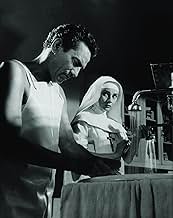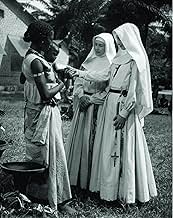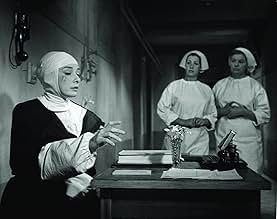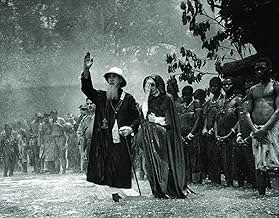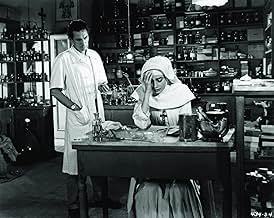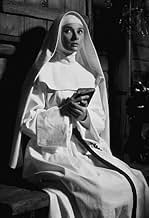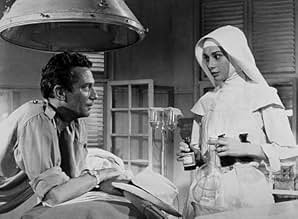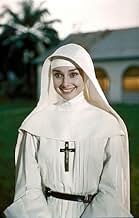After leaving a wealthy Belgian family to become a nun, Sister Luke struggles with her devotion to her vows during crisis, disappointment, and World War II.After leaving a wealthy Belgian family to become a nun, Sister Luke struggles with her devotion to her vows during crisis, disappointment, and World War II.After leaving a wealthy Belgian family to become a nun, Sister Luke struggles with her devotion to her vows during crisis, disappointment, and World War II.
- Nominated for 8 Oscars
- 11 wins & 23 nominations total
- Rev. Mother Emmanuel (Belgium)
- (as Dame Edith Evans)
- Mother Mathilde (Africa)
- (as Dame Peggy Ashcroft)
- Director
- Writers
- All cast & crew
- Production, box office & more at IMDbPro
Storyline
Did you know
- TriviaThis was one of Audrey Hepburn's favorite of her films. It was also one of her most financially successful.
- GoofsWhen the patient in the Congo hospital is being attended by several people, the voice of the actor playing the patient is obviously dubbed over by actor Dean Jagger, who plays Sister Luke's father in the film.
- Quotes
Sister Luke: You can cheat your sisters, but you cannot cheat yourself or God.
Rev. Mother Emmanuel: Have you struggled long enough to say surely that you've come to the end?
Sister Luke: I think I've been struggling all these years, Reverend Mother. In the beginning each struggle seemed different from the one before it. But then they began to repeat, and I saw they all had the same core: obedience. Without question, without inner murmuring. Perfect obedience as Christ practiced it. As I no longer can.
Rev. Mother Emmanuel: Yes?
Sister Luke: There are times when my conscience asks which has priority. It or the Holy Rule? When the bell calls me to chapel, I often have to sacrifice what might be the decisive moment in a spiritual talk with a patient. I'm late every day for chapel or refectory or both. When I have night duty I break the Grand Silence because I can no longer cut short a talk with a patient who seems to need me. Mother, why must God's helpers be struck dumb by five bells in the very hours when men in trouble want to talk about their souls?
- ConnectionsFeatured in Hey Dad..!: Testing Time (1990)
- SoundtracksVoi Che Sapete
from "The Marriage of Figaro"
Written by Wolfgang Amadeus Mozart (as W. A. Mozart)
Played by Gabi and her father on the piano, and recurring throughout the film's score.
Audrey Hepburn - sans makeup and the kind of fashion-plate wardrobe that had already become the hallmark of her movie career - delivers one of her richest performances as the strong-willed and fiercely independent Sister Luke, whose very psyche is torn asunder by the battle between her own innate, personal pride and a sincere desire to live a life of obedience to the Church and its rules. With everything but her countenance hidden beneath a nun's habit, Ms. Hepburn is forced to draw on her resources as an actress, having to convey the titanic internal conflict taking place within her character almost entirely through facial expressions, vocal intonations and body language. And she proves herself more than equal to the challenge. She is brilliantly complemented by Peter Finch, playing the cynical but humane Dr. Fortunati, a dedicated surgeon who is as concerned about Sister Luke's spiritual health as her physical health. The relationship between the two is handled with a great deal of subtlety and tact, never allowing the obvious romantic attraction between the two attractive people to come too much to the fore. Rounding out the excellent cast are Dean Jagger as Gabrielle's loving and concerned father, Peggy Ashcroft and Mildred Dunnock as two older nuns who help guide Sister Luke along the way, and the incomparable Edith Evans, simply astounding as the Reverend Mother who sees unwavering devotion to God and the Church as the one and only goal of a serious nun.
Among other things, "The Nun's Story" is that rare film dealing with religion and spirituality that doesn't contain a single hokey or sentimental moment, that knows the difference between religion and religiosity, that is respectful without being unduly reverential, and that acknowledges the complexity of the human heart in matters of devotion and faith. It also is not afraid to take its time to set the scene and tell its story, never feeling the need to rush headlong into the next dramatic moment just to keep the movie going. In a perfect blending of form and content, the film is every bit as thoughtful, subtle and contemplative as its subject matter, its mood greatly enhanced by the rich and beautiful Franz Waxman score that underlines the seriousness of the work.
In addition to all its other fine virtues, "The Nun's Story" features one of the greatest final scenes and closing shots in motion picture history, a masterpiece of precision and understatement that demonstrates the kind of taste Zinnemman always displayed as a director. The movie is made up of small, beautifully observed moments that, when put together, provide a powerful glimpse into the heart and life of a fascinating, caring individual who wants to do great things in the world but who realizes that the path she has chosen is not the one that will ultimately lead her to her rightful destiny.
On every level of film-making, this is truly one of the greats.
Details
- Release date
- Country of origin
- Language
- Also known as
- Geschichte einer Nonne
- Filming locations
- Brugge, West-Vlaanderen, Belgium(Convent exteriors, other exteriors)
- Production company
- See more company credits at IMDbPro
Box office
- Budget
- $3,500,000 (estimated)
- Runtime2 hours 29 minutes
- Color
- Aspect ratio
- 1.85 : 1
Contribute to this page



